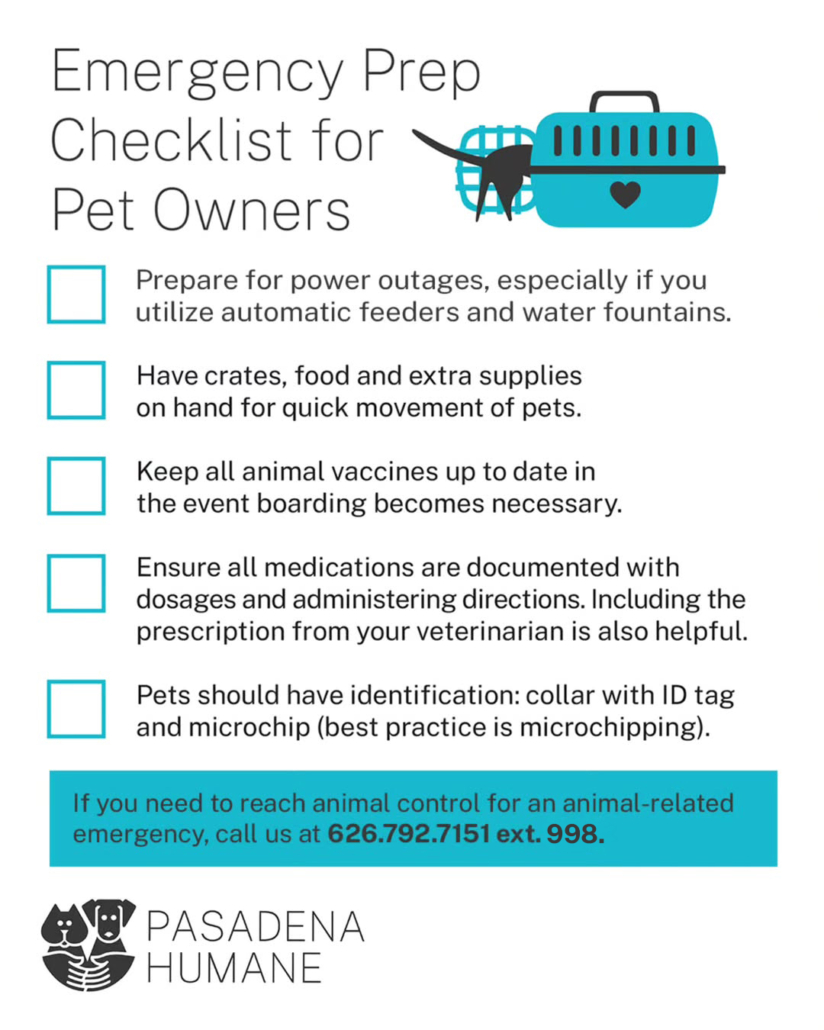Emergency Pet Safety Tips
In the event of an earthquake, fire or even a hurricane, it’s important to be prepared and keep your pets’ safety in mind. Here are a few tips to help you and your pet get through the event safely.
Include your pets in your emergency plan
In case you may need to evacuate, know where your local evacuation sites will be and if they allow pets. Whenever possible, keep your pets with you. Have crates or carriers, leashes, wet and dry food (at least five days worth), a supply of water, dishes, a few toys, and your pet’s medicine packed up in an easy-to-carry bag in case you need to leave quickly. Make sure your pet’s ID tag and microchip are up-to-date with your current contact information in case they get lost.
Do not leave your pets behind. We are here for our community in times of need and are ready to provide emergency boarding for pets from our 11 animal care & control service areas.
Be ready to leave and take your pets
Stay up to date at all times during an emergency. Your city’s website and social media will be your best guide for emergency communications. We also recommend you sign up with your city’s emergency response notification system to get text alerts.
Arcadia: Website | Facebook | Instagram | X | Public Safety Alert Sign-Up
Bradbury: Website | Public Safety Alert Sign-Up
Glendale: Website | Facebook | Instagram | X | Public Safety Alert Sign-Up
La Canada: Website | Facebook | Instagram | X | Public Safety Alert Sign-Up
LA County (Altadena, La Crescenta): Website | Facebook | Instagram | X | Public Safety Alert Sign-Up
Monrovia: Website | Facebook | Instagram | X | Public Safety Alert Sign-Up
Pasadena: Website | Facebook | Instagram | X | Public Safety Alert Sign-Up
San Marino: Website | Facebook | Instagram | Twitter | Public Safety Alert Sign-Up
Sierra Madre: Website | Facebook | Instagram | Public Safety Alert Sign-Up
South Pasadena: Website | Facebook | Instagram | Public Safety Alert Sign-Up
Identify a pet caretaker
If you become ill or hospitalized, it’s important to have someone available who can care for your pet in your absence. This can be a friend, family member, or neighbor, but above all make sure you’ve discussed your plans with this person and let them know about any special needs your pet may have, such as medication or a feeding schedule. Providing your pet caretaker with a spare set of house keys ensures that they will be able to access your pet in an unexpected emergency.
Assemble a go bag
Have crates or carriers, leashes, wet and dry food (at least five days worth), dishes, a few toys, and your pet’s medicine packed up in an easy-to-carry bag. Add a supply of water, and this bag is also useful in the event of a natural disaster, evacuation, or anything that requires you leave quickly with your pet.
Tag and microchip
Although a collar with a visible ID tag and a microchip are always encouraged, it’s especially important during an emergency. If your pet gets lost, a tag and microchip can make it much more likely that they’ll be returned to you. If you’ve moved or changed your phone number, always check that your pet’s ID tag and microchip have been updated with the correct information.
Update vaccines
If your pet needs to be boarded, they must be up-to-date on their vaccines. Check with your local veterinary office to see if they’re offering vaccine services at this time. Always keep a copy of your pet’s medical records in their go bag or somewhere easy to find so you can provide this information when asked.
If you are not at home
Make arrangements in advance with a trusted neighbor who can take your pets to safety.
Prepare for power outages
If you utilize automatic feeders or pet fountains, check to see if they have a backup battery or allow alternate access to food or water in the event of a power outage. If they don’t, keep pet food and water bowls on hand. If you lose power and need to light candles, supervise your pets around open flames – or better yet, opt for flameless, battery-operated candles and flashlights to safely light your way around your home.
Managing anxiety and stress
Unusual weather, seismic events and fires can be as scary for our pets as they are for us. If your pet experiences anxiety and stress from a storm, create a sanctuary space for them, play soothing music, and distract them with puzzle feeders. Over-the-counter calming chews may also help.
After the storm
When the emergency situation is over, check your backyard for downed trees, damaged fences, or other hazards before letting your dog outside.
If you need to reach animal control for an animal-related emergency, call us at 626.792.7151 ext. 998.
Stay safe!



